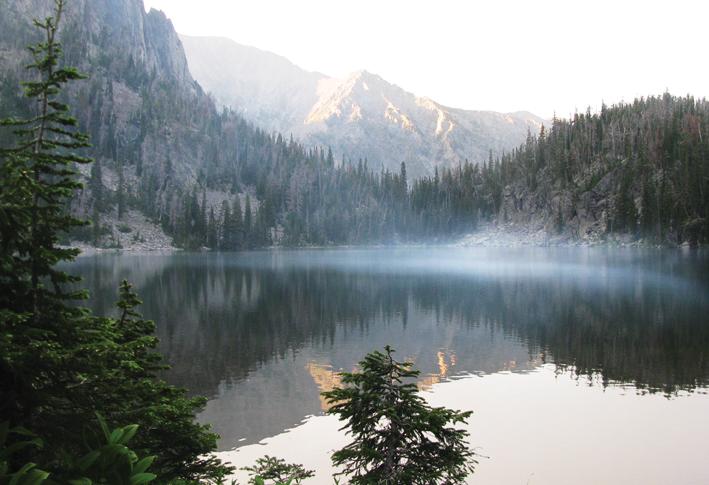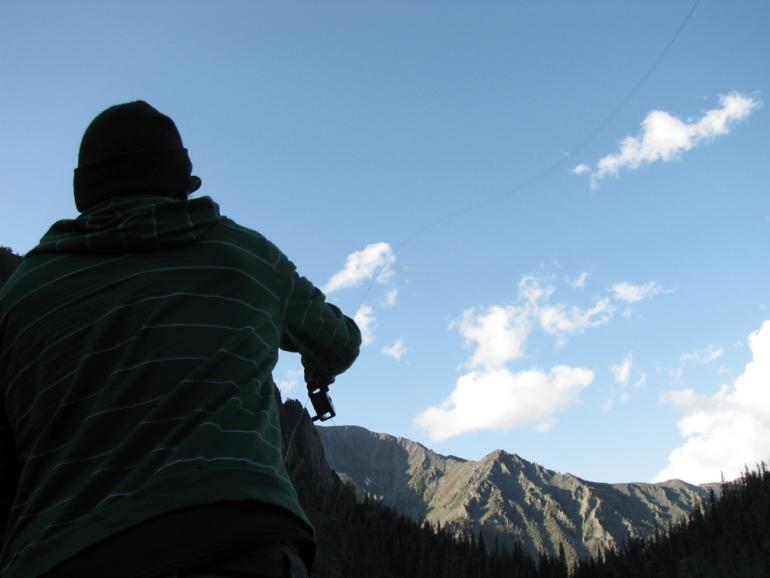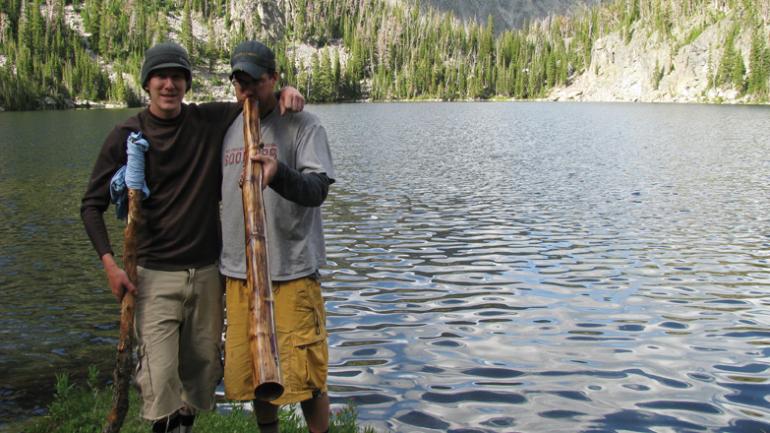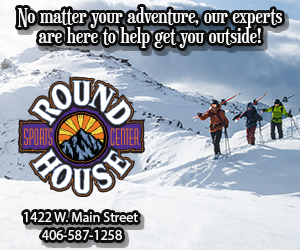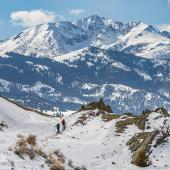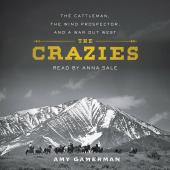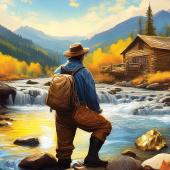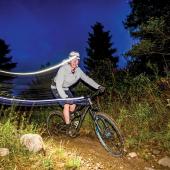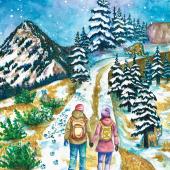Crazy Luck
How a chunk of rock changed the weekend.
The Crazy Mountains run north to south through Montana in a seemingly perfect angular form, like the bottom of a carnivore’s jaw. And though highways run parallel to the range on two sides, no road traverses them. They are steep, rocky, foreboding mountains—mountains that keep the people and animals in their upper reaches relatively isolated.
In short, the name is fitting. But exactly how they became known as the Crazies is debatable. The story I've heard, which may simply be a fable, goes roughly like this: When white settlers first arrived in the region, a family set up a small mining camp to dig enough wealth from the bowels of the earth to feed their children. No one saw them for some time, until one day, a tattered, beaten woman stumbled out of the nether regions, frightening the settlers whom she ran across.
Although she was completely bat-shit and blathering mostly incomprehensible gibberish, she somehow managed to communicate that Indians had killed her family. She had escaped weeks ago, traveling by foot. And that was the last she said before dying.
According to my own family’s oral history, white settlers were much more prone to attacking unsuspecting Indians at the time, although surely atrocities occurred by both sides. Believe what you want.
My love of the Crazies is genetic. My father’s family settled at the base of these mountains in the last decade of the nineteenth century, hoping to eek out a living by working long days in a beautiful—if inhospitable—setting. Annually, I trek into the Crazies with a few other degenerates to fish, drink whiskey, and howl at the moon. The upper regions of the range consist mainly of stone and water in the form of lakes and snow. During the first weekend of July, we hiked into one of the lakes below Crazy Peak (whose name I would share but, being that I don’t know you and am not sure I would want to see you there, I won’t).
Exactly why the Crazies are so rugged up top is unsure. There are two competing theories, both of which I will present in the form presented to me. First, after Pangaea separated, tectonic plates collided, causing ripples on the Earth’s surface, both underwater and on dry land. We call these ripples mountains. Later, the nonequatorial regions of earth got cold; glaciers formed, ripped valleys, and receded, leaving depressions that filled with water, creating lakes. Here’s the second, from Genesis 1:1. “On the first day, God created heaven and earth.” I don’t understand either explanation well, but either over a few million years or on day one these mountains became inhospitably rocky.
While hikes in the Crazies rarely cover long distances (by this I mean anything over ten miles, because I’m fairly lazy) the terrain and elevation change make up for it. Often, trail surfaces consist more of stone than packed dirt. Our hike ran roughly 4.5 miles, following a cascading mountain stream with deep green pools, waterfalls, and intimidating vistas of the stony peaks above.
Reaching our selected campsite on the shores of the lake climaxed by traversing over a half-mile jumble of massive granite boulders, whose danger and inconvenience is obvious. I navigated this field with my friends, saying something stupid like, “Watch your step, we’re all tired and excited, wouldn’t want to get hurt here,” when the shit hit the fan, and my newest enemy—God or the Pleistocene Era—gave me a small taste of perverse irony.
I heard my last name at exactly the same time I felt my heel where my toes would be, if I were getting off of a lift on skis, and I felt something that wasn’t quite pain but eerily similar. I think we lack a word in English to describe it.
A chunk of granite, about the size of a Newfoundland, slid off a ledge and fell directly on my Achilles. I never saw it. I never touched it. It touched me.
So I was face-down on the rocks for a few minutes making guttural noises, swearing, and looking up at my friends for reassurance, but their wide eyes and open mouths weren't quite what I needed. Immediately I started to wonder what, at this elevation and distance, do we do? The obvious answer was to drink enough whiskey so that the pain subsided enough to think clearly, then drink more to develop a plan.
I should clarify a bit. It’s not like my bone was sticking out of my leg, and it’s not some savage Aron Ralston shit where I had to cut off my own arm. It was simply a matter of functionality. I couldn’t walk. This kind of thing could happen to anyone, anywhere. Thankfully, when it was my turn, I was with friends, whiskey, and near my ancestral home, where relatives still scrape the dirt to make a more honorable living than mine.
That night, lying around the campfire, we developed a plan. Two friends hike out the next day, drive a few miles to a dude ranch, and ask them to lead-rope a horse up for me. Decent, right? Well, the dude ranch refused because it was worried about its liability, which might be morally reprehensible but in our current society also prudent (I’m feeling generous, now; at the time my sentiments were somewhat different). The dude ranch proposed search and rescue, which is out of the question in my mind unless the injury will threaten your life or quality thereof until you die.
Instead, I called my cousin Rick, who left the hay fields, shoed some horses, drove them to the trailhead, and brought them to me despite a warning from the dude ranch (pansies) that horses can’t make it up there. I rode an inflatable navigator raft from Walmart—don’t judge me—and paddled with my sandals across the lake, hopped over some rocks, got on a beast named Rooster, and got back to the trailhead just before dark.
An uninsured visit to the doctor cost me a couple hundred dollars, and I received advice only a trained medical professional could give me: “Looks like it’s going to hurt for a while; I would try to stay off it. X-rays are inconclusive. You’re extremely lucky—maybe you should go buy a lottery ticket.” No shit.
Later, on another uninsured visit, a different, more competent doctor told me what I already suspected: my bones are fine, but the softer parts of my ankle and foot have turned into something resembling the inside of a chimichanga.
Without the horses, what would we have done? Hopping on one foot would likely have resulted in more injuries and would have taken days. A friend's idea to build a stretcher and cart me out is no less terrifying from my couch than it was from the mountain. I’m open to ideas for next time if you have them.
But still, you gotta be grateful. It could have been worse—it should have been worse—and we could have forgotten the whiskey. So here’s to random chance, friends, family, Old Number Seven, and the paradox of good luck when your luck is shit. And the extreme hatred of rocks. Next time you see one—a good chunk of granite—spit on it, urinate on it, or defecate on it, and think of me.


